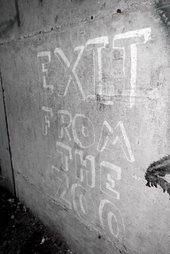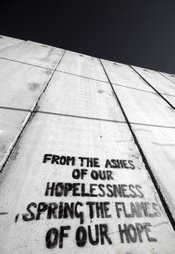Jenin
The landscape in Jenin is beautiful, vast tracts of farm land and hills with a tinge of a desert look. Grape vines, olive trees, corn, tomatoes, zucchini, and other greens abound in the fields. Like many other places in the West Bank, the scene is broken by the presence of a wall or electric fence.
From a distance one can follow the path of this wall, simply by following the cut line of earth on the mountain or valley. It’s easy to see.
The wall, as you know, separates Israel and Palestine. To some degree one could say that Israel has the right to protect itself, so building a wall is fine. But what about when Israel builds the wall several kilometers beyond the border, confiscating vast tracts of precious Palestinian farm land and aquifers? (That’s mostly the case; Israel builds the wall far beyond the Green Line taking land from Palestine.) And what about solving the conflict? It’s not possible to solve the conflict without dialogue, without contact. The wall cuts this direct contact, the possibility of contact.
All of the people we visited told us stories about how their village was reduced in size from 50,000 dunums (donum=1,000 sq. meters) to 5,000 dunums, from 36,000 dunums to 3,000 dunums. Then, when the wall was built, another 700 dunums were confiscated. Then, there’s not water in the village.
“Why?” we ask.
“Israel took control of the wells we had. Now we have to buy water from them. If we don’t buy water from the wells that were once ours, we have to buy water from water companies, which are Israeli anyway. Now our harvest is only 15% of what it used to be, and most of our land is on the other side of the wall.”
“But, why don’t you dig another well?”
“You need a permit from Israel to do that. And I don’t know of a single case where a well permit was approved.”
As you know, there are a lot of checkpoints in Palestine. In Jenin, all entrances and exits to Jenin city are controlled by Israel. Then there are a number of flying checkpoints. In all of Palestine there are roughly 200 flying checkpoints. These flying checkpoints consist of a few Hummers and several soldiers who decide when and where to set up a checkpoint.
Ali told us a story, a sad one. Five years ago his wife was pregnant and she needed to get to the hospital to get an operation (C-Section?). At this time it was forbidden to go to Jenin. “I tried to reach the hospital many times. But the Israelian soldiers forbid us. What I will do?”
“I failed.”
“When I felt that my wife would die, I went through the mountains…
…we reached the hospital and they checked my wife and said the baby was dead.”
“Return before two days and we will do the operation and save your wife.”
“After one day they made the operation… I took the baby back to the land to put it under the earth. My wife stayed at the hospital. Then she was not allowed to return. I was in my village, she was in Jenin, and we could not see each other.”
“I don’t hate the Israelian people; I don’t hate anyone in the world. I believe in peace.”
“I have a message. Don’t be closed-minded. Search the facts. Most of the people in the Middle East hate your people. Why is that? Because, what happened in Iraq, what happened in Palestine, here. I know you people didn’t do anything. But it’s bad for us. For that I don’t hate. Because I know the fact. I can’t be foolish… I can’t be foolish.”


1 comment:
beautiful story.
I think it's a beautiful thing to see people react well to oppression. In one sense, it makes the oppression all the more upsetting. But I think it also gives us a glimpse of true beauty.
Maybe I'm rambling :)
Post a Comment